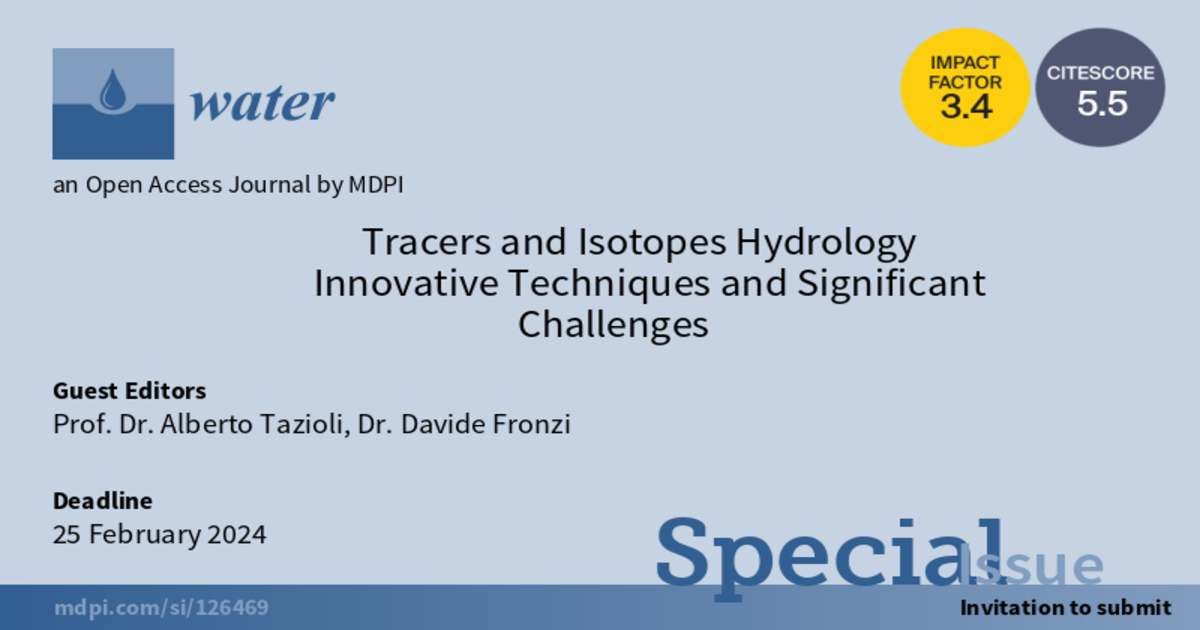- 3.0Impact Factor
- 6.0CiteScore
- 20 daysTime to First Decision
Tracers and Isotopes Hydrology Innovative Techniques and Significant Challenges
This special issue belongs to the section “Hydrogeology“.
Special Issue Information
Dear Colleagues,
Water protection plans, environmental problems, groundwater vulnerability, and engineering geology studies are some of the challenging issues emerging in recent years, to which Tracer and Isotope Hydrology can offer a considerable contribution. Considering this, recent hydrogeological conceptual models integrate water balance results with isotopic and tracers data, as an example.
The purpose of the Special Issue is therefore to present some new techniques employed in hydrology and hydrogeology studies to improve traditional method solutions. In this context, a particular focus will be therefore given to emerging techniques and challenges faced by researchers in the use of natural and/or artificial tracers.
Some issues (although not limited to) can attain to:
- Natural and artificial tracers in recharge studies on the different kinds of aquifers and/or hydro-structures;
- The application of new methods of isotope data processing to hydrological and hydrogeological problems;
- The use of tracing techniques to applied hydrogeological and engineering geology investigations;
- The use of artificial tracers to investigate the actual groundwater flowpaths and aquifer contacts for stratigraphic or tectonic features in complex environmental contexts;
- The development of new tracers and new techniques of measure, tested both in the lab and the environment;
- Studies on surface leaking from lakes, rivers, or reservoirs into groundwater bodies;
- Isotopic fractionation processes due to the infiltration through the soil, snowmelt, complex orography, and so on.
Prof. Dr. Alberto Tazioli
Dr. Davide Fronzi
Guest Editors
Manuscript Submission Information
Manuscripts should be submitted online at www.mdpi.com by registering and logging in to this website. Once you are registered, click here to go to the submission form. Manuscripts can be submitted until the deadline. All submissions that pass pre-check are peer-reviewed. Accepted papers will be published continuously in the journal (as soon as accepted) and will be listed together on the special issue website. Research articles, review articles as well as short communications are invited. For planned papers, a title and short abstract (about 250 words) can be sent to the Editorial Office for assessment.
Submitted manuscripts should not have been published previously, nor be under consideration for publication elsewhere (except conference proceedings papers). All manuscripts are thoroughly refereed through a single-blind peer-review process. A guide for authors and other relevant information for submission of manuscripts is available on the Instructions for Authors page. Water is an international peer-reviewed open access semimonthly journal published by MDPI.
Please visit the Instructions for Authors page before submitting a manuscript. The Article Processing Charge (APC) for publication in this open access journal is 2600 CHF (Swiss Francs). Submitted papers should be well formatted and use good English. Authors may use MDPI's English editing service prior to publication or during author revisions.
Keywords
- hydrogeology
- isotopes
- tracers
- water balance
- groundwater flowpath
- recharge processes
- water resources
- advanced techniques

Benefits of Publishing in a Special Issue
- Ease of navigation: Grouping papers by topic helps scholars navigate broad scope journals more efficiently.
- Greater discoverability: Special Issues support the reach and impact of scientific research. Articles in Special Issues are more discoverable and cited more frequently.
- Expansion of research network: Special Issues facilitate connections among authors, fostering scientific collaborations.
- External promotion: Articles in Special Issues are often promoted through the journal's social media, increasing their visibility.
- e-Book format: Special Issues with more than 10 articles can be published as dedicated e-books, ensuring wide and rapid dissemination.

